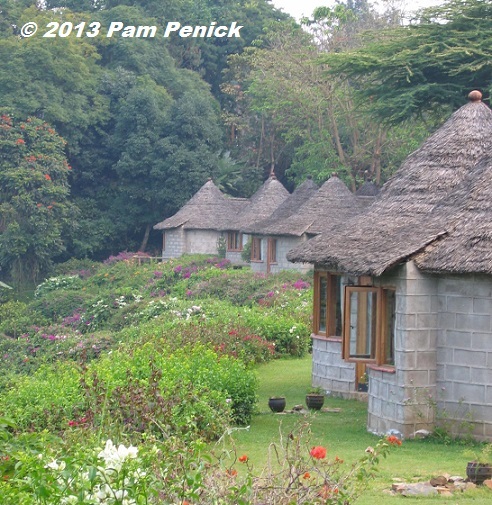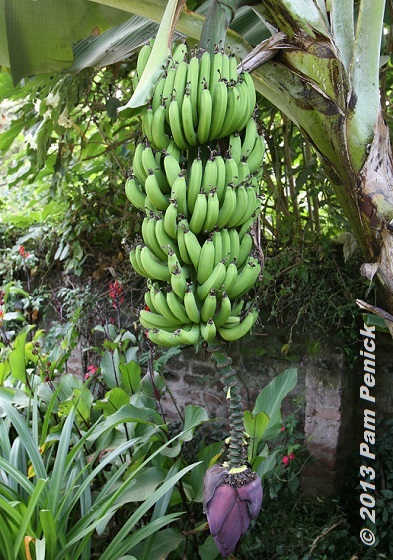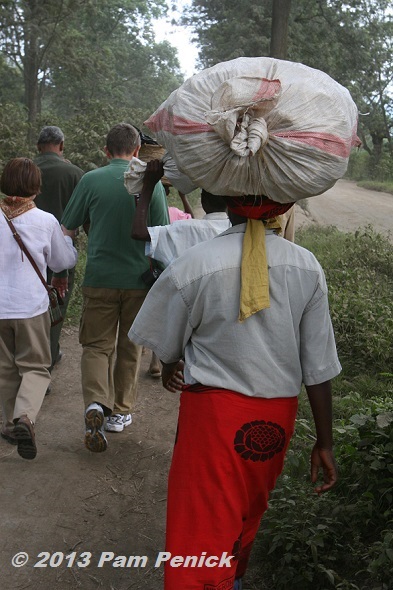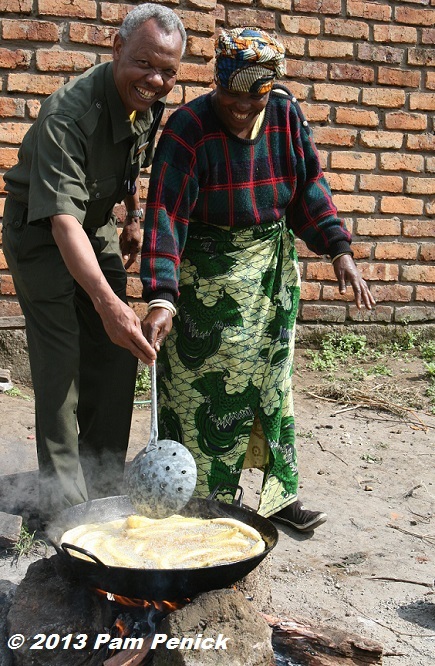Tanzanian safari: Arrival in Arusha and village market

During this gardening downtime, I am really enjoying reliving some of my exotic travels here at Digging. Whether you are an armchair traveler, or making notes for a future trip of your own, or just seeing how my experience compares with yours, I hope you’re enjoying these virtual vacations too. Recently I posted about Beijing, China, and San Miguel de Allende, Mexico. Today I begin an in-depth series about a Tanzanian safari I took in June 2007.
The trip was a 40th birthday present from my travel-loving father, who very generously offered me a father-daughter trip anywhere in the world. An African safari was my dream trip, so he booked us on a Tauck tour during the summer, when my kids would be in camp, my landscape design business slows down, and I could more easily swing a long absence from home.
Our summer is Tanzania’s winter. It’s just barely south of the equator, however, so seasonal temperatures don’t vary all that much, and days and nights are a steady 12 hours each all year. The rains quit in June, when Tanzania’s dry season begins. With sunny days, sparse vegetation, and animals gathering around shrinking waterholes, it’s easier to spot wildlife in the dry season. Mosquitoes, which can carry malaria and other nasty diseases, are also less of a problem then, although you still have to take malaria pills to be safe. (I also got vaccinated for Hepatitis A and typhoid.) On the downside, it can be quite dusty then, and smoke pollution from farmers burning last season’s crops can affect air quality and visibility.
Dad and I arrived in Arusha, Tanzania, at night after 20 straight hours of travel. Excitement kept exhaustion at bay as a Tauck van picked us up at the airport along with a dozen other travelers. Under the airport parking lot lights, large bats dipped over our heads, hunting insects. We drove about a half-hour though a pitch-dark landscape punctuated here and there by cook fires in huts or concrete-block houses, people’s faces looking up at us occasionally as we flashed by.
Our hotel, Serena Mountain Village, was once part of a coffee plantation and overlooks Lake Duluti (pictured above). The grounds were lush and lovely, well irrigated and tended. The rooms were grouped in small courtyards. Here’s ours, in the middle.
Mosquito nets around the beds are a safety precaution even in the dry season.

Bananas — part of the hotel garden
Our first morning, a hotel guide named Erasto escorted a small group of us on foot to the local market. He pulled a few berries off a shrub growing alongside the road and squeezed it open to show us the coffee beans.

Locals passed on their way to the market. The women carried huge bundles on their heads — how do they do that? — and wore colorful sarongs.
The market was crowded. Cars and wheelbarrows pushed through the throngs of people. Most of the sellers were women, but here is a man selling citrus.
Women with enormous stalks of bananas and other items balanced on their heads passed us left and right.

This woman stir-frying bananas was expecting us. Erasto paid her a little something, and she showed us what she was doing and offered us a taste. We’d all just read the Tauck brochure advising us not to eat from the market and shook our heads in embarrassed but polite refusal, not wanting to risk illness. Only Caroline, a fellow traveler from California, was brave enough to taste it. It was well cooked after all. I should have tried it too. Next time say yes!
Dry goods for sale
My dad
A mountain of dried whole fish for sale
Nearby, a woman was selling printed cotton sarongs for $20 apiece. I’m sure that was just the starting point.
I admired the way she had displayed them, in little tepees of color.
Erasto was a friendly, knowledgeable guide, and we enjoyed our first outing in Tanzania. But I was eagerly anticipating the game drives to come.
Next up: Game drive in Tarangire National Park.
All material © 2006-2014 by Pam Penick for Digging. Unauthorized reproduction prohibited.
















I’m guessing this was for your 40th birthday, but it could just as easily been your dad’s – seriously – he looks 40.
He was 68. He’ll be thrilled to see your comment. He is certainly young at heart, and today, in his mid-70s, continues to travel far and wide. —Pam
I have been thoroughly enjoying your travel posts. I’ve been to both China and Mexico, but never to Africa. I am thinking that now I need to plan a trip to Africa.
I can’t wait to read more about your adventures!
Noelle
You should, Noelle. I think you’d enjoy the adventure of travel to such a different part of the world. And if you enjoy animal watching, East Africa is heaven. —Pam
That market looked great. And it’s interesting to see some of the same produce being sold as we have here. Loved the all the color. Okay, my husband says I need to help make dinner but I’ll be back to read your other travel adventures. 🙂
And I’ll be looking for your safari post soon, Jean. I’m curious to see the differences between east and south African safaris. —Pam
You look so much like your dad! (And damn, you two are aging phenomenally.) Thanks for sharing your travels with us–I’m catching up on all my garden blogs and I was thrilled to see these posts.
Well, we look older than that now — ha! And yes, there’s definitely a family resemblance. Thanks for “traveling” with me, Heather. —Pam